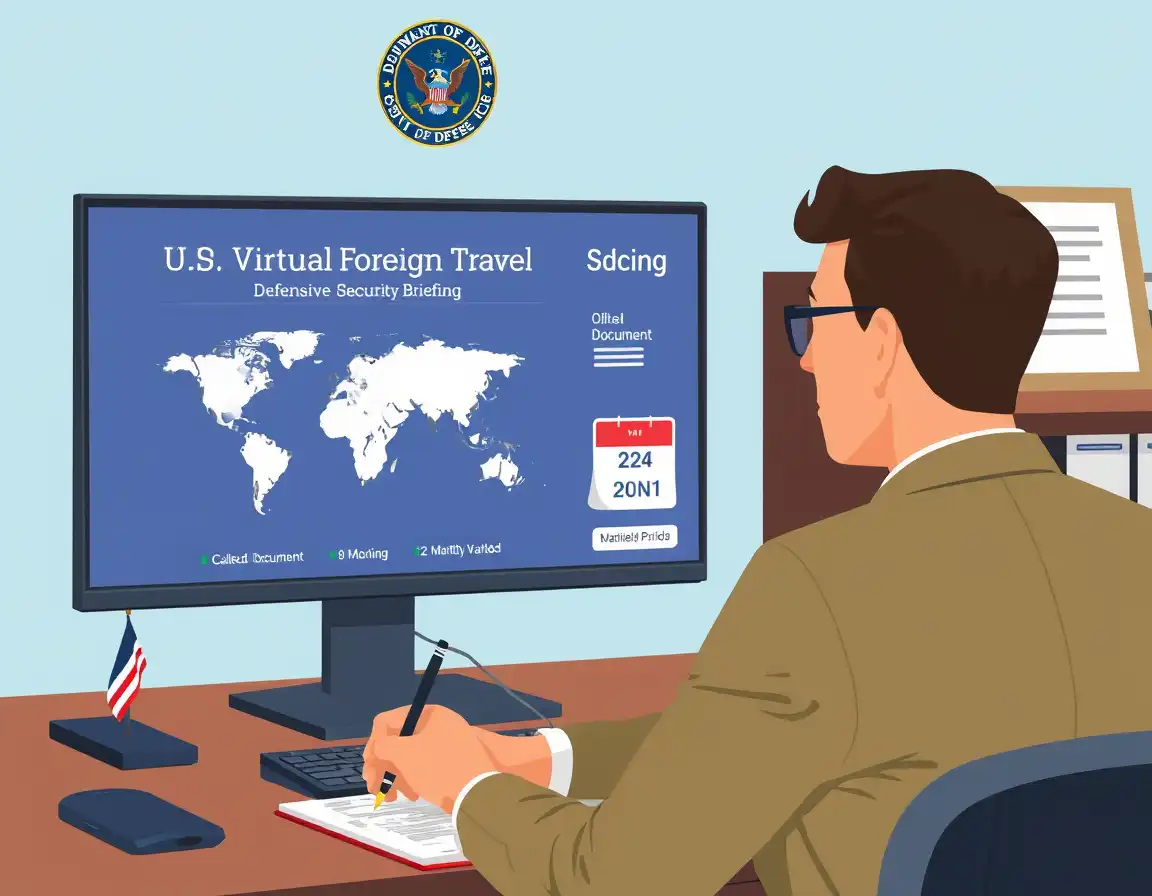There is no doubt that traveling overseas has its risks, too. These risks are also particularly sharp when one enjoys government clearance or possesses sensitive information. To counter such threats the United States Department of Defense has enacted a Defensive Foreign Travel Briefing to travel among the staff in different countries. The briefings would contribute to the protection of national security, the protection of personal safety, and adherence to the rules of the agency.
So just how frequent should you get a travel briefing on the defensive? Indeed, the significance related to being in good standing with regard to federal travel policies should entirely be understood through being knowledgeable concerning frequency, eligibility, and the schedule of renewal. The following is a rundown of main facts about those problems.
What is a Defensive Travel Foreign Briefing?
Defense Foreign Traveling Briefings are security training activities that are compulsory, and they orient the federal personnel, contractors, and services to become informative about patients traveling outside the United States. They are meant to warn and inform the members of the different dangers involved in foreign intelligence gathering, cyber snooping, terrorism activities and criminal activity targeting the nationals of the United States.
Conventionally, the briefing involves social engineering, secure usage of electronic devices, travel, as well as reporting suspect cases. With this fundamental education, a cadre will have a better chance to detect and respond to threats on a journey because of the threatened status of a nation.
How Often Must You Receive It?
How frequently do you have to attend a defensive briefing into foreign travel? All this varies depending on the agency and frequency of travel by the individual and the degree of security status he or she possesses. However, the majority of the standards in the DoD stipulate that this briefing has to be made before every foreign trip, and it remains valid within a 12-month period unless there is a significant change in the status of the threats.
That aside, it is a common advice that most agencies should carry new briefings prior to all travel episodes despite whether the immediately proceeding journey was during same calendar year. These updates guarantee that the personalities are acquainted with the present-day threat environment, travel advisement, and the slightly updated procedures, which apply to their destination.
Foreign Travel Briefing Requirements by DoD
The United States Department of Defense issues requirements for foreign travel briefing: The DoD has laid out the requirements for travel briefing in security policy documents such as DoD Directive 5240.6 and DoD Manual 5200.01. These documents state that a security pre-travel briefing must be given to any cleared individual who intends to travel to a foreign country, irrespective of whether the travel is for business or personal reasons.
It applies to all DoD civilian employees, members of the armed services, and contractors with security clearance. The briefing must then be recorded, typically in an agency-designated system such as the Foreign Travel Reporting System (FTRS) or e-QIP. A debriefing might also be given following the trip, especially in cases where security incidents happened.
These needs are born out of the increasing worries of foreign intelligence agencies that are targeting the U.S personnel. Even the most informal contacts with the foreign country, including at the airport, at hotels, or during conferences, may result in the leakage of important information. This explains why the agency security officers are strict on compliance and failure to report foreign travel or briefing can also be considered as security judgment failure. Agencies consider this seriously so that there cannot be any soft spot in protecting national interests.
Who Needs to Take the Briefing?
Not everyone who travels abroad has to undergo the training but there are many in positions of sensitivity. Following is a list of those who need the defensive foreign travel briefing:
- A person holding any national security clearance, such as Confidential, Secret, or Top Secret.
- Contractors or DoD civilians having access to classified or sensitive data.
- Military personnel traveling abroad on official orders or other travel orders.
- An employee engaging in the use and management of export controlled technology or critical systems.
Even those without formal clearances may be encouraged to take a security briefing if they’re part of departments such as cybersecurity, intelligence, or nuclear programs.
Briefing Validity and Renewal Timeline
After the presentation of a defensive foreign travel briefing, how long is the briefing useful? In most cases, these briefings last 12 months unless a person travels to another region, gets into an incident of critical importance, or has an alert about an incoming threat.
Any of these conditions requires a new briefing to be completed despite the fact that the former briefing is not expired yet. In a similar manner when an employee changes agencies or job roles and needs a different level of clearance the employee may have to also undergo a briefing upgrade process and he may be required to undertake briefing renewal early to suit standards of the new organisation.
Foreign Travel Briefing Frequency Rules
The foreign travel briefing frequency varies depending on the applicable agency policy and the nature of one’s work and even by threat level worldwide. Here are some common rules of frequency:
- Required by many branches of DoD and IC (Intelligence Community) agencies.
- For those who travel frequently or their agency accepts annual briefing renewals.
- New clearance holders should take the briefing before their first foreign trip.
- Agencies may conduct mass re-briefing if security risks increase worldwide.
Knowing just how often a defensive foreign travel briefing can eliminate any last-minute surprises in the way of security violations.
How to Access or Schedule the Briefing
Scheduling your defense travel security briefing depends on the agency or command structure to which you belong. Most organizations provide briefings through:
- Security officers or Facility Security Officers (FSOs)
- Online training platforms such as CDSE (Center for Development of Security Excellence)
- Human Resources or security liaison units
In case you are confused, get a hold of your security manager or travel coordinator for them to clarify how to access the correct version of the briefing and document confirmation of compliance.
Penalties for Missing the Briefing Requirement
Serious consequences for not having conducted a foreign travel briefing include the following:
- Not being approved for travel
- Security violations entered into your personnel file
- Temporary suspension from clearance or work privileges
- Disciplinary action against you or termination of employment/contract
Agencies have a strict policy regarding foreign travel compliance. If you are planning to travel abroad, check the briefing requirement in advance so that everything is in order. This is not only to keep you in compliance, but ensures your own safety abroad as well.
Final Thoughts
The Defensive Foreign Travel Briefing is more than a mere formality; it is indeed a step toward protection of both the national security and the individual. Understanding how often you must receive a defensive travel briefing is beneficial in compliance and avoiding repercussions of penalty. Whether once, twice, or more each year, ensure that the schedule stays current with agency expectations.
When unsure, conduct a briefing prior to each trip, talk to your security team, and document everything. After all, it could mean the difference between the success or failure of your career, and your safety. Visit legal news and update here.





